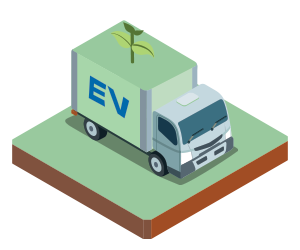ThaiBev’s logistics operations are managed in alignment with the supply chain management strategy: visibility, synergy, integrated risk management, centralized management, and standardization in line with the company’s business strategy and PASSION 2025. We take into account environmental
and social responsibility in our logistics activities and fleet management to reduce negative ESG impacts in the supply chain. ThaiBev is committed to emission-free logistics in accordance with our net zero emission targets by 2040
(Scopes 1 & 2) and by 2050 (Scope 3).
We focus on three areas in our logistics and fleet management
to ensure operational efficiency, cost-effectiveness, and continuous stakeholder engagement throughout the supply chain:
- Optimize logistics operations and increase reliability
and predictability by using logistics technology and green innovation
Strengthen logistics networks and strategic partnerships to manage end-to-end logistics and supply chain
effectively
- Empower our logistics partners through supplier
development programs for positive impacts in the supply chain
ThaiBev has implemented the ESG program in management of our outsourced logistics providers to ensure that they operate in compliance with our sustainability standards. Treated as ThaiBev’s suppliers under the service category, these providers are required to acknowledge and accept ThaiBev’s Supplier and Business Partner Code of Practice. They are subjected to supplier screening and supplier assessment processes which address the key ESG issues, i.e. climate strategy, water management, human rights, occupational health and safety, and business ethics, prior to the start of service provision.
Additionally, we monitor in-house and outsourced drivers’ performance and behavior via our platforms to track and improve our logistics environmental performance, i.e.,
fuel consumption and greenhouse gas emissions from transportation. In addition, ThaiBev measures Scope 3 greenhouse gas emissions from outsourced logistics activities under the category “Upstream and Downstream Transportation and Distribution”. It accounts for 6.53%
of ThaiBev’s Scope 3 greenhouse gas emissions.
To affirm our commitment to minimizing the environmental and social impact of our logistics operations, we integrate three ESG objectives into our logistics and fleet management priorities:
- In 2021, ThaiBev piloted a transition from internal combustion engines to electric vehicles and material handling, starting with commercial trucks. In 2022, we replaced the LPG forklifts used in our warehouse with electrically powered forklifts that have solar-rooftop charging stations. In 2023, there were 2 electric commercial trucks, 18 electric passenger cars, and
147 electric forklifts in use, bringing a reduction of 500 tCO2e in greenhouse gas emissions per year. Moving forward, ThaiBev will continue to increase the
proportion of corporate electric vehicles as one of
the key initiatives to achieve net-zero emission
by 2040 (Scopes 1 and 2).
- At Lampang regional distribution center, ThaiBev has installed a solar rooftop and LED lights, which consume 75% less energy than normal lightbulbs, and has reduced the proportion of non-renewable electricity purchased from the provincial authority by more than 50%. In 2023, ThaiBev installed solar rooftops at two distribution centers in Nakhon Ratchasima and
Surat Thani. In addition, HAVI installed solar rooftops
at Bangplee Industrial Estate in Samut Prakan Province, which reduced the proportion of non-renewable electricity purchased from the provincial authority
by around 20%. In 2024, ThaiBev plans to install solar rooftops at two additional distribution centers in
Chon Buri and Pathum Thani provinces.
- ThaiBev liaises with our distributors to consolidate shipments by matching pick-up locations with our business partners who are using the same delivery route. The finished goods are then combined and delivered on a single trip, with a system to ensure
safety and traceability.
- ThaiBev also uses backhaul logistics to transport
used glass bottles to minimize the environmental impacts through effective route planning and area management. In 2023, 95 million used glass bottles
were collected and transported using backhaul logistics. In total, 1,251,823 deadhead kilometers were avoided.
- ThaiBev implemented the Certu System in 2022 to optimize logistics processes, automate workflow,
and gain access to real-time visibility of our logistics operation. Using real-time and predictive insights based on AI and data analytics, the platform provides logistics matching by assigning drivers to the nearest shipment locations, whether out-bound or backhaul, thereby reducing empty kilometers, improving overall logistics efficiency, and reducing fuel consumption. In 2023,
the Certu System has been implemented at our regional distribution center in Phra Nakhon Si Ayutthaya Province for outsourced truck assignment and shipment automation, allowing full visibility of both in-bound and out-bound transportation, and real-time monitoring of shipment status.
- ThaiBev has implemented a driver development program to improve both in-house and outsourced drivers’ ESG performance, focusing on greenhouse gas emission reduction, energy efficiency, and safe driving. The drivers are also monitored for their discipline and driving behavior using an online tool synced with the GPS. In 2021, ThaiBev co-established the Logistics Development School with Siam Cement Group (SCG), one of the Thailand Supply Chain Network (TSCN) co-founders. A professional driving school for both in-house and outsourced truckers, it has been
authorized by the provincial education commission
as a private non-formal school. The school employs experienced instructors and provides training facilities in compliance with Department of Land Transport standards. As part of the training, drivers learn
fuel-efficient driving techniques, which not only help
to reduce greenhouse gas emissions but also improve road safety.

Liters / day / driver
fuel saving
Average trips during
pilot operation
Total transporting distance









